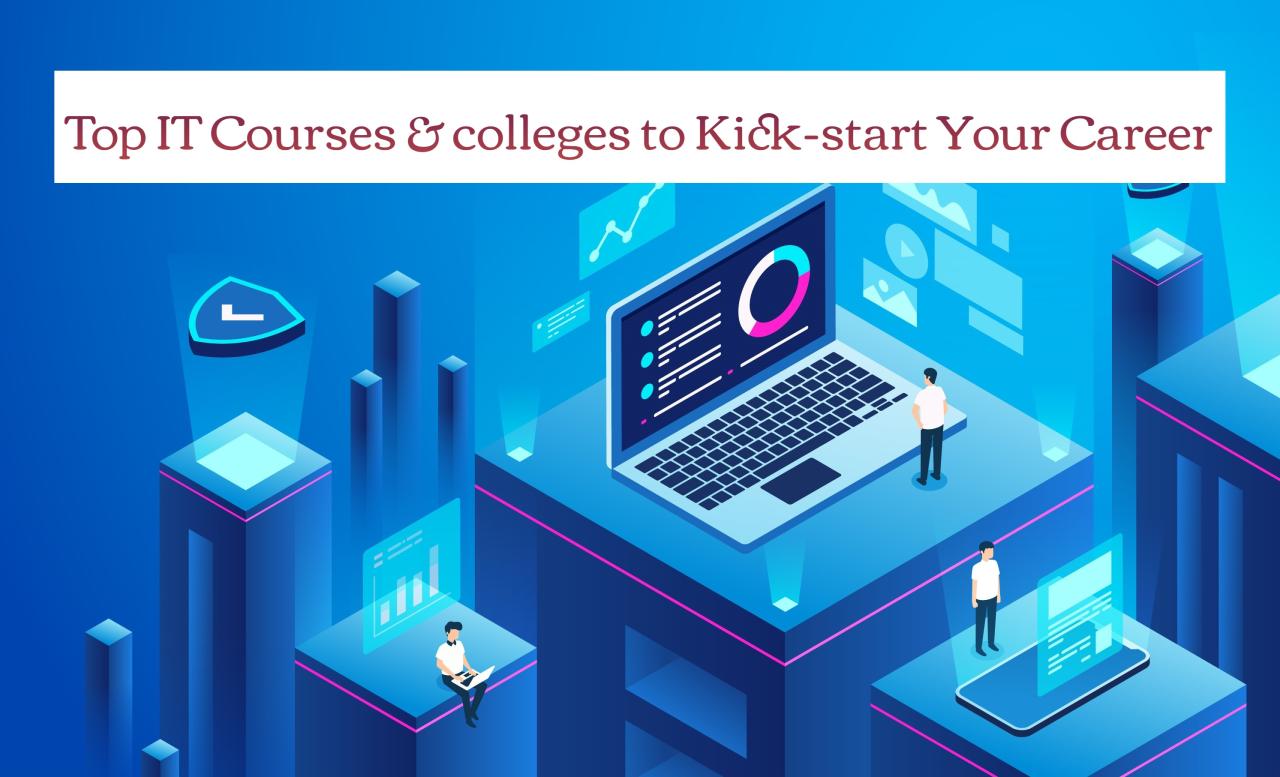Top-rated IT courses for beginners with career guidance offer a fantastic pathway into a booming tech industry. This guide breaks down how to choose the right course, build essential skills, and land your dream IT job. We’ll explore popular career paths, analyze top-rated courses, and equip you with the job search strategies you need to succeed.
So you’re looking for top-rated IT courses with career guidance? That’s awesome! Finding the right path can feel like watching a nail-biter, kind of like that Milan 2-1 Juventus (Jan 3, 2025) Game Analysis – ESPN match – lots of tension! But with the right resources and planning, your IT career journey will be a victory.
Remember to research different programs and check for job placement support.
From understanding the current IT job market landscape and its diverse opportunities to mastering the art of crafting a compelling resume, this guide provides a comprehensive roadmap. We’ll delve into the importance of certifications, networking, and building a strong online presence – all essential elements for a successful career transition. Learn how to navigate the challenges faced by beginners and discover the secrets to overcoming them.
Top-Rated IT Courses for Beginners with Career Guidance

The IT industry is booming, offering a wide array of lucrative and fulfilling career paths. This article explores top-rated IT courses designed for beginners, providing insights into career options, course selection criteria, curriculum analysis, and effective job search strategies. We’ll also showcase success stories to inspire your journey into the exciting world of information technology.
Introduction to Top-Rated IT Courses for Beginners
The IT job market is experiencing explosive growth, driven by increasing digitalization across all sectors. Demand for skilled professionals in areas like cybersecurity, web development, and data analysis far outpaces the supply. Pursuing IT certifications significantly enhances career prospects, demonstrating competency and commitment to employers. Certifications validate your skills, making you a more competitive candidate and potentially leading to higher salaries and faster career progression.
Thinking about boosting your career with top-rated IT courses for beginners? Many programs offer excellent career guidance, helping you land that dream job. However, remember to check travel conditions before attending any in-person sessions, especially if you’re in the Kansas City area, as you saw from this news report: Winter storm warning issued for Kansas City, as weekend travel to.
Once you’ve sorted out your travel plans, you can focus on finding the perfect IT course to launch your new career.
Consider these success stories:
- Sarah J.: A former teacher, Sarah transitioned into a successful web development career after completing a beginner’s coding bootcamp. Her new career offers higher earning potential and a greater sense of purpose.
- David L.: David, previously a retail worker, leveraged a cybersecurity certification to land a junior analyst position. His dedication to learning and obtaining the certification impressed his employer.
- Maria K.: Maria, with a background in marketing, upskilled in data analysis through an online course. Her newfound analytical skills helped her secure a promotion and a substantial salary increase.
IT Career Paths Comparison, Top-rated IT courses for beginners with career guidance
| Career Path | Required Skills | Average Salary (USD) | Job Outlook |
|---|---|---|---|
| Cybersecurity Analyst | Networking, security protocols, incident response, ethical hacking | $75,000 – $120,000+ | Excellent, high demand |
| Web Developer | HTML, CSS, JavaScript, backend languages (e.g., Python, Java), databases | $60,000 – $100,000+ | Excellent, high demand |
| Data Analyst | SQL, data visualization tools (e.g., Tableau, Power BI), statistical analysis | $65,000 – $110,000+ | Excellent, rapidly growing |
Identifying Top Courses Based on Learner Reviews and Industry Recognition
Identifying “top-rated” IT courses involves considering several key factors. Course content should be up-to-date and relevant to current industry standards. Instructor expertise is crucial, ensuring that the course is taught by experienced professionals. Positive student feedback, including ratings and reviews, provides valuable insights into the course quality and learning experience. Finally, alignment with industry-recognized certifications adds significant weight, signifying that the course prepares students for professional certifications.
Top-Rated Beginner IT Courses
| Course Name | Provider | Price (USD) | Key Features |
|---|---|---|---|
| Complete Web Development Bootcamp | Udemy | $199 | Comprehensive curriculum, hands-on projects, lifetime access |
| Google IT Support Professional Certificate | Coursera | Free (with optional paid certificate) | Industry-recognized certification, job-search assistance |
| Cybersecurity Fundamentals | Cybrary | Variable (Free and Paid options) | Focus on practical skills, interactive labs |
| Introduction to Data Science | edX | Variable (Free and Paid options) | University-level curriculum, industry-relevant projects |
| The Data Science Course: Complete Data Science Bootcamp | Udemy | $199 | Comprehensive curriculum, hands-on projects, lifetime access |
Accreditation and industry recognition are paramount. Accredited courses often adhere to higher educational standards and provide more credibility to your qualifications. Industry recognition ensures the course content aligns with real-world demands, improving your job prospects.
Online courses offer flexibility and accessibility, while in-person courses provide more structured learning and direct interaction with instructors and peers. The best learning style depends on individual preferences and learning needs.
Curriculum Analysis of Top Courses

Most beginner-level IT courses share common modules. Understanding these modules and their real-world applications is key to successful learning.
Three common modules include:
- Fundamentals of Computer Science: This module covers basic concepts like data structures, algorithms, and programming logic. In a real-world setting, this knowledge underpins the development of efficient and reliable software applications.
- Software/Tools: Python, Java, C++, pseudocode editors
- Networking and Security Basics: This module introduces network topologies, protocols (TCP/IP, HTTP), and fundamental security concepts. It’s crucial for understanding how data flows and how to protect systems from threats.
- Software/Tools: Wireshark, packet tracer, virtual machines
- Database Management: This module covers database design, SQL queries, and data manipulation. In real-world applications, this skill is essential for managing and analyzing large datasets.
- Software/Tools: MySQL, PostgreSQL, SQL Developer, database management systems
Hands-on projects and practical exercises are vital for solidifying theoretical knowledge and developing practical skills. They provide opportunities to apply learned concepts, identify knowledge gaps, and build a portfolio of work to showcase to potential employers.
Career Guidance and Job Search Strategies
Crafting a compelling resume and cover letter tailored to specific IT job descriptions is essential. Highlight your skills, projects, and achievements using s relevant to the job requirements. Networking is crucial; attending industry events, joining online communities, and connecting with professionals on LinkedIn can open doors to opportunities.
Building a strong online presence, particularly on LinkedIn, is vital. A professional profile showcasing your skills, experience, and accomplishments can significantly improve your visibility to recruiters and potential employers.
Resources for job searching and career development include:
- Indeed
- Glassdoor
- Dice
- Professional networking events
- Career counseling services
Illustrative Examples of Successful Career Transitions
Let’s revisit our earlier success stories in more detail:
- Sarah J. (Web Developer): Sarah, previously a high school teacher, found her teaching skills transferable to web development. Her patience and ability to explain complex concepts to students helped her excel in communicating technical ideas to clients. The bootcamp provided the technical skills, while her teaching background gave her a unique advantage.
- David L. (Cybersecurity Analyst): David’s retail experience taught him customer service and problem-solving skills, which proved invaluable in his cybersecurity role. His certification demonstrated his commitment to the field, making him a highly sought-after candidate.
- Maria K. (Data Analyst): Maria’s marketing background gave her a solid understanding of data interpretation and its business implications. The data analysis course equipped her with the technical skills to analyze data effectively and draw actionable insights.
Beginners often face challenges like lack of experience and competition from experienced professionals. Addressing these challenges requires building a strong portfolio through personal projects, participating in hackathons, and seeking internships or volunteer opportunities to gain practical experience.
Typical Career Progression: Web Development

A visual representation of a typical web developer career progression might look like this: Beginner (HTML, CSS, basic JavaScript) -> Junior Developer (proficiency in JavaScript frameworks, basic backend skills) -> Mid-Level Developer (expertise in a specific framework, experience with databases) -> Senior Developer (architectural design, team leadership, mentoring) -> Lead Developer/Technical Architect (high-level architecture, strategic planning).
Conclusive Thoughts
Breaking into the IT world doesn’t have to be daunting. By choosing a top-rated course, focusing on practical skills, and implementing effective job search strategies, you can significantly increase your chances of landing a fulfilling and rewarding career. Remember, continuous learning and networking are key to long-term success in this ever-evolving field. So, take the leap, explore the options, and start building your future in IT!
Expert Answers: Top-rated IT Courses For Beginners With Career Guidance
What’s the average salary for entry-level IT jobs?
Entry-level IT salaries vary widely depending on location, specific role, and experience. However, you can expect a competitive salary, often exceeding national averages.
How long do most beginner IT courses take to complete?
Looking for a career change? Top-rated IT courses for beginners often include career guidance, helping you navigate the tech world. But if hands-on work in a medical setting appeals more, check out surgical tech programs near me to explore that path. Ultimately, the best course for you depends on your interests and goals, so consider what truly excites you before making a decision about top-rated IT courses for beginners.
Course durations vary. Some can be completed in a few weeks, while others might span several months, depending on the intensity and curriculum.
Are there financing options available for IT courses?
Many providers offer payment plans or accept financial aid. Check with individual course providers for details.
What if I don’t have any prior IT experience?
Beginner courses are designed for individuals with no prior experience. They start with the fundamentals and gradually build your skills.
